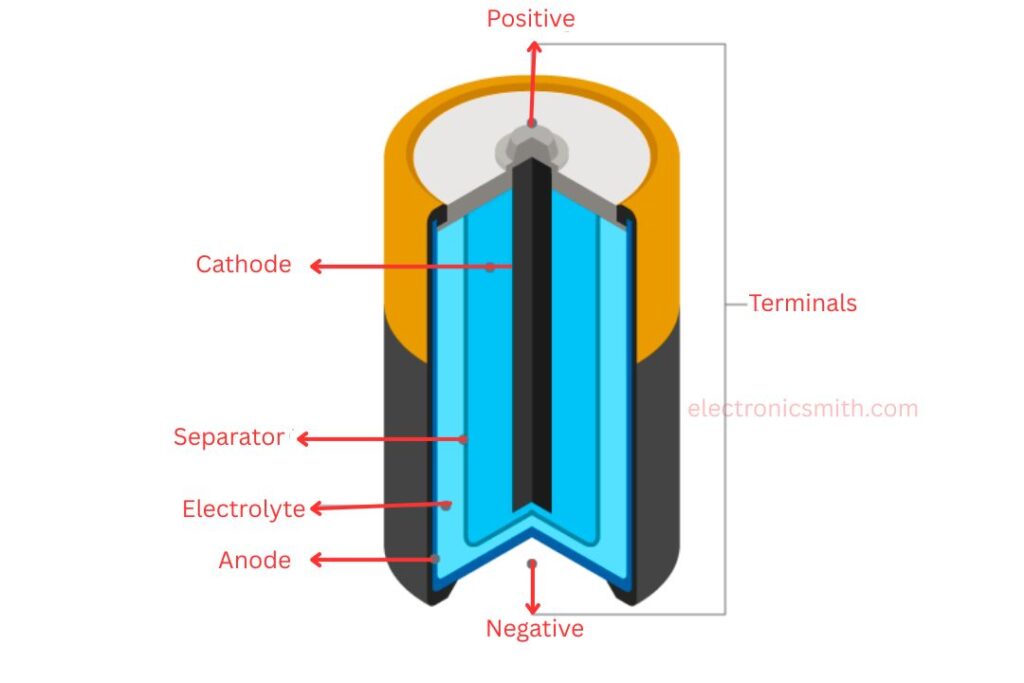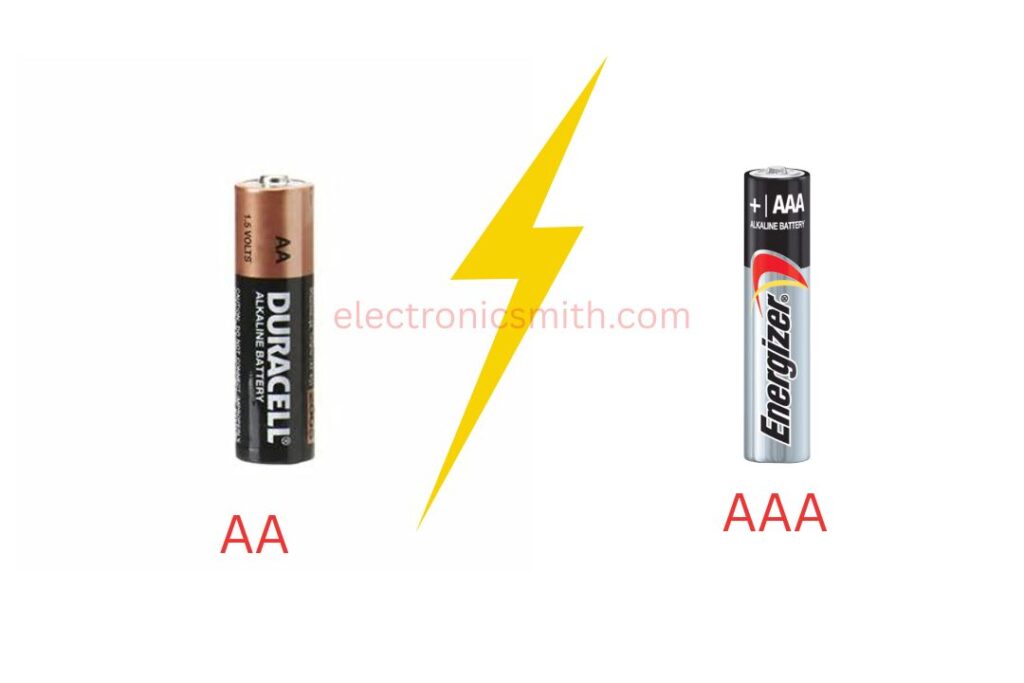What is a Battery?
A battery is a device that contains chemical energy and converts it into electrical energy. It energizes a variety of devices, ranging from small consumer electronics such as remote controls and cell phones to larger systems such as automobiles and backup power systems. Batteries are crucial for portable power, enabling devices to function without being connected to a wall socket.
Essentially, a battery is made up of one or more electrochemical cells. A cell comprises two terminals—one positive, which is referred to as the cathode, and one negative, referred to as the anode—and an electrolyte, a chemical compound that facilitates the flow of ions within the battery.
How Does a Battery Work?

Separator
The separator is an insulating wall within the battery that prevents the cathode and anode from touching while facilitating ion flow.
Electrolyte
The electrolyte is the chemical substance that allows ions to move between the cathode and anode.
Terminals
Terminals are the outside contact points (positive and negative) where the device or circuit connects to the battery.
Positive
The positive terminal connects to the cathode and draws electrons upon discharge.
Negative
Negative terminal is attached to the anode and is a source of electrons that travel throughout the circuit.
When a battery is attached to an apparatus and the circuit is closed, a chemical reaction takes place within the battery. This reaction results in electrons being emitted out from the anode. These electrons travel along the external circuit (such as wires or components of an apparatus) to the cathode. This movement of electrons constitutes electricity.
As the electrons move through the external circuit, the electrolyte within the battery enables charged atoms—ions—to pass between the anode and cathode within the cell. This passage maintains the balance of charge and ensures that the reaction will continue. As long as this internal chemical reaction is ongoing, the battery continues to supply a constant flow of electricity to power the device it is connected to.
AA vs. AAA Batteries: The one you should choose

When it comes to powering everyday gadgets, AA and AAA batteries are likely the two most popular types you’ll encounter. From remote controls and wall clocks to children’s toys and flashlights, these batteries are essentially ubiquitous. The main question that arises is which is the best gadget to use, and the main differences so you can make the optimal decision.
What are they
Both AA and AAA batteries are typical cylindrical dry cells. They’re available in one-time use (disposable) and rechargeable forms. They’re generally manufactured with alkaline, lithium, or nickel-metal hydride (NiMH) chemistry.
AA Batteries are slightly larger and typically contain more energy, hence having longer lifetimes.
AAA Batteries are thinner and lighter, making them well-suited for small devices.
Different size
The most obvious difference is the size:
AA Battery: Approximately 50.5 mm in length and 14.5 mm in diameter.
AAA Battery: Slightly smaller at 44.5 mm in length and 10.5 mm in diameter.
That slight difference in size actually makes a huge impact on the battery’s ability to store power.
Capacity and output
This is where the larger size of AA batteries comes in handy.
AA Batteries: Commonly have between 2000 to 3000 mAh capacity (alkaline ones), so these are a great bet for demanding devices such as digital cameras, game controllers, or heavy-duty flashlights.
AAA Batteries: These typically will range from roughly 1000 to 1200 mAh. They are most suitable for devices that won’t consume too much power, such as remote controls or timers for the kitchen.
Rechargeable ones keep in line with similar patterns—although AA will usually have better capacity.
Usage
AA Batteries – Best Used For:
Power-Hungry Devices: Cameras, game pads, Bluetooth speakers, etc.
Medium-Powered Usage: Toys, LED flashlights, wall clocks.
If someone wants more time between changes, then AA is the one to use.
AAA Batteries – Best Used For:
Low-Power Devices: Remote controls for TVs, wireless keyboards, digital thermometers.
AAAs are Ideal for small devices where space is limited and power requirements are low.
Cost Comparison
AA Batteries are generally more expensive than AAA, but worth it considering how long they can last, particularly in devices that consume power quickly.
AAA Batteries are usually cheaper, but in the wrong device, you’ll burn through them quickly and may end up spending more in the long run.
Environmental Consideration
Let’s not forget the environmental side of things:
Disposable Batteries: Both AA and AAA types come in alkaline versions meant for single use. They’re convenient but can be wasteful. Make sure to recycle them properly!
Rechargeable Batteries: They’re an environmentally friendly, less expensive solution in the long run. AA rechargeables typically hold greater capacity, and this is fantastic for energy-draining devices.
Rechargeables might be worth the thought if you’re attempting to reduce waste and save you some dough in the long term.
Effect of weather
Residing in a place like Calgary where the winters get really tough, cold-weather functionality is actually worth considering:
AA Batteries: Lithium AA batteries specifically perform well at low temperatures and are a wise option for outdoor devices.
AAA Batteries: They don’t quite hold up so well in cold temperatures, though lithium AAA varieties exist and work better in cold weather.
Availability
Both types of batteries are easily found. But you may see AA batteries more frequently offered in bulk packs, simply because they’re used in more devices.
If you’re in Calgary, Batteries Store Calgary carries a good selection of both AA and AAA batteries in all three types—alkaline, lithium, and rechargeable—so you’re set either way.
Conclusion:
It ultimately comes down to what your device requires:
Use AA batteries if you’re charging something that requires a lot of power or if you want to last longer between battery changes.
Use AAA batteries when your device is small and doesn’t need a lot of energy.
Either ways, choosing the correct battery makes your device perform more efficiently and saves you trouble. And if you’re seeking quality and selection, Batteries Store Calgary has what you need to keep your devices charged and ready to use.
